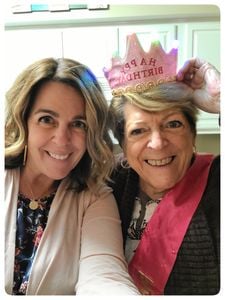Thinking about changing homes, especially when you’ve spent years building memories there, can feel like you’re standing at a huge crossroads. It’s not an easy decision, and that’s okay. My husband, Rhommer, and I have walked this path alongside countless individuals and families, both professionally and personally. We’ve combined our experience as professionals and family members to offer you perspective, insights, and practical help. Our goal is to empower you to proactively steer your ship toward a next chapter that truly supports you. As I’ve told my clients for years, it’s about being informed and proactive, because if you’re not, you end up under stress and an urgent timeline, which can lead to decisions that aren’t the best.
Sometimes, the home that was perfect for raising a family or building a career just doesn’t fit our lives anymore as we get a little older. Recognizing this isn’t about giving anything up; it’s about giving yourself the gift of comfort, safety, and continued joy.
What Might Make You Think About a Change?
Life has a way of shifting, and sometimes our homes just can’t keep up with those shifts. Based on what folks often face, and what I’ve seen both as a social worker and now as a realtor, here are some things that might get you thinking about a living arrangement that’s a better fit for this stage of life:
When daily living gets tricky: This gets into what therapists call ADLs, or activities of daily living – things like putting your socks on, getting out of bed, using the bathroom, or making food. Maybe you’re finding things like getting dressed, taking a bath, or just moving around the house a bit harder than they used to be. Stairs can become a real challenge, and things like frequent falls or even near misses are big warning signs that the house might not be as safe as it needs to be. I saw many people admitted to nursing homes because they had a fall, broke a hip, and then couldn’t go home because of the stairs. Sometimes, even getting around with a walker or cane is tough if hallways are narrow or bathrooms aren’t set up right. You might even notice it’s harder to keep up with basic home upkeep the way you used to.
Health needs changing: As health evolves, your home needs might too. Keeping track of medications can become difficult, leading to forgotten doses or mix-ups. Existing chronic conditions like arthritis can worsen, making simple tasks painful. I know personally how debilitating arthritis can be. If you’re finding yourself taking frequent trips to the emergency room, it could be a sign that your current home isn’t supporting your health needs adequately, or that things are getting missed that could be managed better at home. Frequent ER visits often happen on a Sunday at 6 p.m., don’t they? My family and I learned to follow up with the primary doctor on Monday to get a bigger picture of why something happened, not just treat the immediate issue. An infection, like a UTI, can even cause sudden, surprising cognitive changes that make living alone unsafe.
Dealing with memory or confusion: It’s normal to misplace keys sometimes, but if you or a loved one is experiencing confusion, forgetting familiar things, getting lost, or struggling with decisions, it’s a sign the home might not be safe without extra support. My mom had short-term memory issues that affected her medication management. We even used a motion-activated camera (with her permission!) to make sure she was taking her meds correctly. This might sound unconventional, but it was a way to keep her safe while she was still at home. Missed appointments or bills can also be indicators. Changes in personality, like increased anxiety or isolation, can also be tied to cognitive changes and suggest a need for more community or support. Safety risks like leaving the stove on are serious concerns. Rhommer even shared how his own COVID symptoms affected his memory sometimes, making him forget he left the stove on – it’s not just elders facing this! Scams targeting seniors are also a terrible safety risk.
Feeling isolated or losing purpose: Our homes are where we connect with others. If it’s hard to get out, see friends and family, or stay involved in hobbies and community activities because of where you live or mobility issues, isolation and loneliness can set in. My mom was a people person, and when she couldn’t drive and get out to see people, it made her sad, and things started to spiral. Without purpose, people can fail to thrive – this is something I learned working in nursing homes that embraced the Eden Alternative philosophy. Sometimes, you might see a decline in appearance or hygiene, which can be a quiet sign someone is struggling. Not being able to drive easily can make accessing groceries or medications tough, adding to the isolation.
How to Figure Out If and How Soon a Change is Needed
Seeing some of these signs doesn’t automatically mean you need to pack your bags tomorrow. Sometimes, bringing in some help at home, making a few modifications, or using helpful devices can make a big difference and let you stay put safely. There are even things like medication blister packs or locked med boxes that can help manage medications.
Figuring out the timing and what’s right involves being honest and kind to yourself by asking some key questions:
- Does your current home truly work for you right now? Think about your day-to-day life. Are stairs a constant battle? Are the bathroom or kitchen layouts making things harder?
- Will your home work for you over the next 5 years? Try to look ahead a bit. What might change with your health or mobility? Can your home adapt?
- What does your financial picture look like? Having a clear understanding of your budget, income, and what you can afford for housing, whether it’s staying put with support or exploring other options, is really important. Looking at monthly costs for senior living options can feel daunting, but remember that some current home expenses, like utilities or lawn care might go away. Understanding your financial resources helps you make informed decisions.
- If this home isn’t the long-term plan, what feels like a good fit for your next chapter? What kind of place lines up with the lifestyle you want, your health needs, and what you can afford? Have you even peeked at different options like independent living or assisted living? I recently helped a couple who had been in their home for 46 years. He didn’t want to go to senior living, but his wife did. They had a lot of “pillow talk” (conversations facing each other in bed!) to figure out their compromise, and they ended up finding a perfect ranch condo with no stairs.
- Can you still easily connect with your family, friends, and the community you love from where you are now? Think about how your home’s location impacts your ability to stay social. Your location and community are often what give you that purpose every day.
Having open, kind, and compassionate conversations with your family and support system is key. As a social worker, I saw firsthand how difficult these conversations can be, but approaching them with empathy makes a huge difference. If you’re helping an elder in your life, it’s important to gain their consent and empower them; give them control in ways that feel right while allowing you to help. It’s their journey, and they should feel like they’re steering that ship. When I went to doctor’s appointments with my mom, I always asked her permission to be there, ask questions, and take notes right in front of the doctor. This kept her engaged, informed, and in control.
Finding the Right Guides
Making a big move is complex, and you don’t have to do it alone. Building a team of experienced people to support you is essential. This could include healthcare professionals, financial advisors, attorneys, professional organizers, and certainly friends and loved ones. When it comes to selling your home, finding the right real estate agent is a huge step. For elder transitions, it’s incredibly helpful to find a realtor who has experience with elders.
An experienced realtor who understands senior moves can be a true partner. Beyond knowing the market, look for someone who:
- Has a “win-win” mindset. They want the best outcome for everyone involved.
- Is genuinely interested in getting to know you, your lifestyle goals, and the big picture of what you want for your next chapter. They should take the time to really listen.
- Knows your local market and community inside and out.
- Shows clear experience, communicates well, and has integrity. You need someone you feel comfortable with, like a trusted advisor.
- Can connect you with a network of other helpful professionals.
We get that it’s a sensitive time. We can help you navigate things like showings while minimizing disruption for an elder still living in the home. Ideally, the house can be empty for showings – I’m a big fan of an empty house when it comes to selling. This is the easiest and least disruptive way to move. It’s scary, disruptive, and unsafe for an elder to have 60 showings come through their home while they’re sitting in the bedroom, like I recently saw. We also understand the legal side, making sure the person signing the paperwork legally has the right to sell and understands what’s happening, especially if it’s an elder. We always make sure the elder understands what they are signing; family shouldn’t just take the pen and sign for them.
Having your team of experts, including a qualified realtor who understands the nuances of this transition, can truly help you navigate this journey with grace and confidence.
What’s Next? Steer Your Ship!
Taking the time to explore these questions and consider your options is the first step in proactively steering your ship towards a brighter future. This isn’t about being rushed; it’s about being prepared and making informed decisions that align with your needs and desires.
We’re here to support you. If you’re ready to start exploring your options or simply want to have a confidential conversation about what might be the right path for you, please contact us to start a conversation.
Before you even do that, the most important step you can take right now is to start the conversation with your closest loved ones. Share your thoughts, listen to theirs, and remember that approaching this with kindness, compassion, and open dialogue is key to navigating this journey together.
With care and compassion,
Peggy

Me and Mom!



